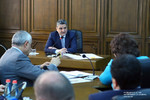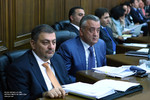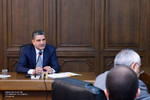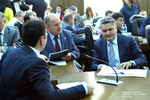Tuesday, 30 October 2012
Statement By Prime Minister Tigran Sargsyan At Joint Sitting Of National Assembly Standing Commissions During Discussion Of 2013 State Budget Bill
Honorable Vice-President of National Assembly Sharmazanov,
Dear Mr. Minasyan,
Dear Colleagues,
As Mr. Minasyan said, I will try to present the philosophy and the key points of the 2013 State budget bill.
Firstly, I would like to refer to the situation in 2012, which creates prerequisites for the implementation of the 2013 State budget.
At the moment, we summarize the data provided by the National Statistics Service, including the month of September, we can say that we have approximately 7% economic growth, and the budget deficit, which was planned at 3.1%, according to our estimates, will be lower - 2.8%.
We can see from World Bank, International Monetary Fund estimates, as well as following the consultations held with our experts and PIU executive directors that deficit will be slightly lower than revenue. We have met the revenue target, which means that the figures presented to you are realistic providing a basis for 2013 budget projections.
This year’s budget stands out in that for the first time we have tabled a document called “Project risks and management possibilities.” Since it is the first time we have submitted a detailed methodology, please do not be too strict in your estimates considering that it needs to be improved yet.
Formerly we used to talk about risk events, trends, and prevention measures, this time trying to present the numerical evaluations and how these risks can be manifested, and that is how we manage those risks.
The 2013 draft budget is based on three key principles, namely the ones submitted to you during the debate of government program. The first principle is to maintain the competitiveness of the economy. The second principle consists in developing human resources and the third one implies existence of effective institutions.
As Mr. Minasyan noted, this means that we are coming forth with a draft based program budgeting. At the same time, the following 4 key areas are targeted in the 2013 budget.
First, provide for a sustained pace of economic growth as witnessed over the past couple of years. We can see that the threshold of 7% growth is quite realistic for the running year and our task is to maintain the high pace of growth and push ahead with the drive of economic diversification.
In this respect, our program seeks to encourage exports.
Our second policy emphasis comes on social policy, where radical changes are proposed: In particular, a shift is to be made in social policy according to the following principle: vulnerable groups should have greater access to higher education, employment, including participation in training programs at the expense of the State: We shall guarantee health security for them, with an additional emphasis on increased welfare benefits.
The above radical changes in our policy are based on the studies conducted by the International Monetary Fund, the World Bank and the Government of the Republic of Armenia.
When the growth rate of benefits exceeds the growth rate of other criteria, when wages grow more slowly than the benefits and pensions growth rate, there are no incentives for people to work to solve their problems.
They are trying to bring their household criteria standards set by the state in order to enjoy social benefits, and work motivation significantly distorts the World Bank methodology of the studies that were done not only in Armenia, leads to the conclusion that we should first of all provide socially vulnerable groups involvement in public life and the first place to work.
This is also the objective behind the introduction of the integrated social service system, which we started implementing in cooperation with the World Bank in 2013. At least 10 points should be effective in the Republic of Armenia in 2013. That will enable us to identify the real problems of socially vulnerable families and target assistance to those families.
The State must help vulnerable households’ senior children get higher education. We have already begun to implement programs like this, including access to legal advice and health services. The integrated social service system is supposed to help us to solve this problem.
Important is that we are going to keep in focus the problem of benefits provided to the families of killed freedom-fighters. Our surveys shown that, unfortunately, this group is still the most vulnerable in the country and, therefore, we must increase the rate of benefits.
At the same time, in 2013 the number of welfare package beneficiaries will be increased by 30 thousand. This innovation that took place in 2012, proved successful. The meetings we had have demonstrated that we should expand the scope of beneficiaries and we need to earmark the necessary amounts in the State budget.
The third direction is essential to improve the business and investment environment. You may know that we follow closely the ratings posted in the Doing Business report. And not only we, but either you can see that the leaders of neighboring countries are paying great attention to this factor. The year 2013 will be crucial in this respect.
Despite the significant progress we boasted in the Doing Business report recording a 18-point advance to the 32nd position among 184 countries, nevertheless, we can see that much has still to be done in terms of improved trade logistics so that the cost of exported goods is minimized toward the nearest ports.
Unfortunately, the World Bank estimates it to be quite high at this point of time. It stands at USD 1800 for a single container, including the brokers’ services which are quite expensive. We also need to minimize bureaucratic processes, because in practice our exporters face more barriers than described in the legislation.
The second important issue is tax collection. While we managed a 40-point advance in this category, we are still past the best 100. We expect that the planned introduction of electronic tax returns as of next January 1 will significantly improve the situation in this field. The State will subsidize the cost of electronic signatures for small and medium businesses. The process of online reporting too will be supported by the State.
At the same time, it is important for us to improve judicial practice, because as studies have shown, it takes over 400 days to review judicial cases in courts. Economic entities are thereby facing serious time and financial losses and it seems to be clear that there is still much to do in this area.
This year we significantly improved the situation with different types of permits, especially concerning the construction ones. As to improving the business environment, access to electricity, gas and water for small and medium businesses is essential to us.
Another fundamental direction is the ongoing talks on the deep and comprehensive free trade agreement with the EU: You know that last February the EU announced the start of negotiations with the Republic of Armenia and we have already held two out of six rounds of talks over Armenia’s commitment to harmonize domestic legislation the European standards.
These reforms will be carried out in the following directions: Food security is a field where we should have a monitoring system corresponding to the best European standards, including labs, a methodology on how to evaluate food security, trained personnel, and what is most important is to ensure that all of these rules are applied in practice.
The second area under the deep and comprehensive free trade agreement is the registration of intellectual property. Legislative amendments will have to be implemented, including the passing of normative acts. We mast have the law enforcement agencies and the judiciary to take steps toward the protection of intellectual property.
The third target is the improvement of judicial practice, especially as far as economic disputes are concerned.
Customs administration is the fourth direction which implies introduction of the green track regime and settlement of invoice prices. These reforms are to be completed by the end of 2013.
We have set ourselves a target to complete all the stages of negotiation in 2013 and state that we have met our commitments. Though the formal procedure implies that we need to complete the process in 2014, we intend to finish it in 2013.
As to improving the overall business environmental and implementing a new industrial policy, great importance is being attached to the state-private partnership principle. You may know that the new industrial policy, as developed in cooperation with the World Bank implies that a new platform should be formed together with the private sector, Moreover, it is important that this program was developed and funded by the active participation of the private sector, which was subsequently approved by the joint session and approved by the Government.
We have targeted 12 areas where, according to study findings, we have serious export potential and our efforts should be directed to the realization of that potential.
You may also know that the State and the private sector have already signed agreements in two areas. The government undertakes to implement specific actions, with the private sector being responsible for making investments, increasing exports and creating new jobs. I think that the program will be taking effect as soon as next year.
A major problem is to maintain macroeconomic stability, which is essential in today all predictions, the global economy is in a very dangerous situation for the year 2013 the International Monetary Fund and the World Bank have reduced their growth rate forecasts. A second feature is that where in the past it used applied to the developed countries, for the first time now it is applied to the developing countries as well.
That means that in 2013 we should be very cautious with the design of macroeconomic policy, taking into account the potential risks. In view of the above, we are looking forward to a 6.2 percent economic growth against this year’s 7%.
We should have sufficient resources to be able to neutralize the negative manifestations of the risks. At this point, we anticipate USD100mn worth of assistance from the World Bank in case developments come to adversely affect the performance of our budget. Besides, we have some 1 billion 100 million dollars in the Crisis Fund that can be used under a pessimistic scenario, if necessary.
I would also point out that we have to pay attention to all the programs that were started in 2012, which have been ongoing in the field of health care in keeping our focus on improving the quality of health services.
You may know that in the past two years sizeable resources were allocated to regional health centers so that they could compete with the ones available in Yerevan, thus contributing to the harmonious development of the provinces.
The program is to be continued. 13 community outpatient clinics will be built with public funds. In addition, healthcare institutions will be rehabilitated and upgraded in the regions.
It is important for us to have improved financial mechanisms in the healthcare system. We are going to submit to the National Assembly a new concept, taking into account international best practices, as well as the existing shortcomings, including the State order, the co-financing schemes and mechanisms, drug procurements, as well as the introduction of new mechanisms for price regulation.
A second priority is the sphere of education: Educational reform is the center of our attention in the same way, I want to know that 2013 was going to hold a donors' meeting to prepare for a big project, which includes 31 reforms and infrastructure finance working in the European Union, the Russian Federation together with our partners, so that in 2013, the gathering of donors to become reality.
I wish to advise you that we expect to get at least USD300mn from donors, which must be directed to school building activities. Unfortunately, still great is the number of schools in need of overhaul. 1400, at least 300 schools will need to repair the state budget will present you with a clear list of schools where we carry out reconstruction work at the same time, financial resources are not sufficient to make all the schools, where we started the renovation work, to bring to their end.
I would like to refer to the rationale set behind the breakdown State budget expenditures. Most of the expenditures (84.7%) cover the following five areas: social sector expenditure - 41.8 percent, including education, health and social protection sectors.
The second direction is the protection of public order and national security, where our costs are set at 21,1%, the economic sectors - 14,1%, debt service - 4.6%, community budgets and equalization funds 3.1%. Great attention will be paid to the external debt index
As per the estimates of international organizations, Armenia will be ranked as a country with middle or lower-gravity debt burden in 2013. We will do everything to minimize the risks associated with the management of external debt. Concluding my speech, I would like to point out that it would be hard to overestimate the role of the State budget in ensuring the country’s normal development.
From this perspective, the National Assembly debates are of paramount importance to us. We look forward to constructive and interested discussions. I assure you that we are open to dialogue.
Thank you for attention.











